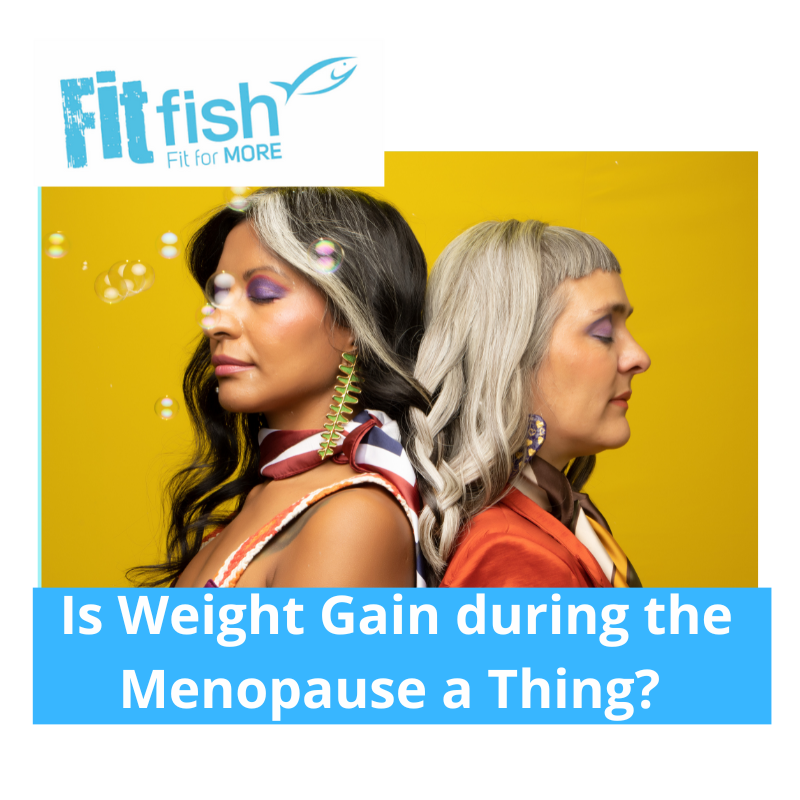Is Weight Gain during the Menopause a Thing?

Have you experienced weight gain during the menopause, or are you apprehensive about it based on others’ shared experiences and struggles?
It’s a topic that has piqued my interest as I enter my mid 40s and delve deeper into nutrition at a clinical level.
Is it a genuine concern, and if so, what can be done about it?
The truth is that the peri-menopausal years and the years following the menopause have been identified as high-risk periods for weight gain in a woman’s life.
This is primarily due to the continuous depletion of ovarian follicles, which results in reduced oestrogen production and a relative increase in androgen levels.
Oestrogen (also known as estrogen) plays a crucial role in inhibiting hunger signals in the body. As oestrogen levels decline during perimenopause and menopause, women can experience heightened hunger signals, potentially leading to weight gain.
Additionally, this hormonal imbalance can cause a redistribution of fat stores, favouring abdominal fat deposition. So, even if you’ve never carried weight around your stomach before, you might start to notice it during this phase.
Furthermore, the reduction in oestrogen levels results in fewer curves and less definition around the waist, making it feel “thicker.”
This physiological change is compounded by a reduction in lean muscle mass. As we age, we naturally lose muscle mass, and to maintain it, we must actively engage in physical activity. The decrease in lean mass, coupled with a shift toward proportionally more fat than muscle, leads to a slowing of your basal metabolic rate (BMR), meaning you burn fewer calories in your daily activities.
So yes, weight gain during the menopause is a real concern, but it is not inevitable.
The good news is that, on average, menopausal weight gain is only about 0.5 kilograms per year. While this can accumulate if left unchecked, it’s also a manageable amount to address each year.
The extent of this weight gain can vary. If you are already overweight or obese, it could be more significant because the necessary habits may not be in place to address the gain, and psychological factors can come more into play. This life stage can coincide with increased responsibilities, such as caring for aging parents, teenagers, or young children and additional responsibilities at work which can lead to stress and emotional eating.
Unhealthy dietary patterns, characterised by easily accessible processed foods, may contribute to weight gain during this busy and emotionally charged season of life.
Hormonal changes can also lead to negative emotions, prompting some women to seek solace in food.
Irregular sleep patterns and excessive alcohol consumption can further exacerbate the issue.
A progressive reduction in physical activity is also observed in this age group due to time constraints, fatigue, and diminishing strength. This lack of physical activity contributes to weight gain, and often, food intake is not adjusted to accommodate this decrease in exercise.
So, what can be done?
- A balanced diet of mainly whole foods works well for any situation.
- Consume foods rich in calcium (e.g., milk, nuts, green leafy vegetables) for bone health.
- Include iron-rich foods (whole cereals, lean meat, eggs, spinach, nuts, and seeds) to address heavy menstrual bleeding.
- Consume magnesium-rich foods (green leafy vegetables, nuts, seeds, legumes) to alleviate menopausal symptoms.
- Incorporate foods rich in phytoestrogens, such as soybeans, to alleviate menopausal symptoms and promote musculoskeletal and bone health.
- Ensure adequate Vitamin D intake and consider supplementation.
- Avoid spicy foods, alcohol, and caffeine to relieve hot flashes.
Address Emotional Eating and Stress:
- Identify reasons for eating outside of normal hunger cues and seek ways to address them.
- Find relaxation and stress-reduction techniques that work for you.
- Seek support if you regularly experience negative emotions.
Exercise:
- Engage in physical activities you enjoy.
- Focus on building and maintaining muscle mass.
Get Support:
- Seek help for overwhelming situations and responsibilities.
A note on Hormone Replacement Therapy (HRT): While it can be beneficial, more research is needed to understand its impact on body fat distribution. Consult your doctor if you believe HRT might benefit you.
Take heart; weight gain during the menopause is not an inevitability.
A healthy, balanced lifestyle continues to benefit you in many ways and reduces your risk of developing various diseases.
If you are looking for some more support to ensure you are not eating for emotional reasons, then our Healthy Whole and Free course could help! You can find out more and sign up here.
Comments
MARIANNE says
Thanks Gaynor, that's very helpful xx
Replies
ADMIN says
Glad it helped! :-)
Replies
MELISSA says
This course was brilliant in understanding my relationship to food bad habits and healing of my emotional eating . Gaynor is brilliant sbf so very helpful
Replies
ADMIN says
Ah thanks for that comment Melissa!! So great seeing your journey!
Replies
Add comment
Add comment
Add comment
Add comment
Add comment